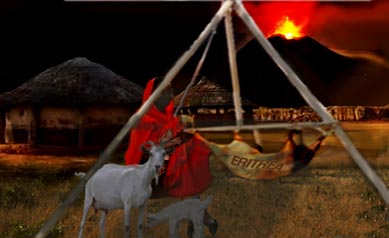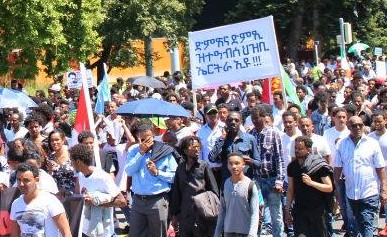The Churning

There were two demonstrations in Geneva in June 2015 on the occasion of the Human Right Council’s 29th session (HRC 29): one was in opposition to the damning report issued to the HRC by a body it mandated, the Commission of Inquiry on Eritrea (CoIE), and the other was in support. There was, as usual, number inflation, which is common after every demonstration anywhere in the world: what is clear is that large groups of Eritreans showed up on both sides, for and against. HRC went on to extend the mandate of the CoIE and the Special Rapporteur for another year and expanded the mandate to investigate if crimes committed by officials of Government of Eritrea rise to the level of crimes against humanity. What is the UN’s Human Right Council likely to do next? What is the Government of Isaias Afwerki and its supporters likely to do next? What should the Eritrean opposition do next?
Human Rights Council
The HRC is a UN organ and it will move at UN speed. I know it is a shock to us Eritreans when they don’t “prioritize” our case but there are 193 countries in the world and many of them have existential problems. There are countries with “peacekeeping forces” since 1948-49 (Middle East/India-Pakistan) for God’s sake. If the UN’s Monitoring Group on Somalia and Eritrea is an indication, there will be reports, which will eventually be brought to the attention of the Security Council. Chances are the mandate will keep getting renewed and the reports will continue to be filed.
CoIE’s standard of proof—same one used by the CoI of North Korea; same one used by the COI of Syria—is “reasonable grounds exist to believe” and, by that standard, I believe the CoIE will find that crimes against humanity were committed in Eritrea. This is because “crimes against humanity” are, “widespread and systematic” attack against civilians including murder; enslavement; imprisonment; torture and enforced disappearance and “other inhumane acts of a similar character intentionally causing great suffering or serious bodily or mental injury.” This is not something that the Government of Isaias Afwerki does rarely or occasionally but all the time: it is a defining characteristic of the regime.
I believe then that the General Assembly will endorse CoIE’s finding—with China and Russia voting against. Some African states who are strong advocates of “African solutions to African problems” will probably chafe at this. And, in the end, proving “crimes against humanity” is a very difficult standard to meet, as CoIE’s chairperson explained, when there is no access to the country. And, the Security Council is yet to designate even wildly-publicized crimes against humanity like those in Srebrenica. (China abstained; Russia voted against.)
Government of Isaias Afwerki
Confronted with a damning report, the Eritrean government has, as expected, gone for Phase I of its three-phase response: categorical denial. Everything in the report of the Commission of Inquiry on Eritrea (CoIE) is a total fabrication, it said. Phase II, of which we saw a glimpse thanks to an untimely leak from the Eritrean consulate to Washington, DC, is proxy talks and back channels. Phase III is to signal activity in the absolutely bare minimum required to have people get off its back. These include claiming the constitution is being re-drafted; saying that the indefinite national service was “quietly” changed and is now only 18 months; teasing a Civil Code and Criminal Code based on no constitution is being finalized. Phase III includes pretending that it is “independent politics” to do things badly because you are doing them under pressure.
What is typical about the Government of Isaias Afwerki is that for a regime that brags about its political independence, the only time it changes is when intergovernmental agencies and foreign governments pressure it. In fact, it will eschew a significant percentage of its population as it “dialogues” and “debates” with the intergovernmental agencies and foreign governments about issues of governance, which should be our issue. That is: the Isaias Afwerki regime is responsible for internationalizing Eritrea’s governance issues.
What is also clear is that, as is the case in every command-economy country, there is nothing unusual for the pro-government Eritreans to show up in large numbers. Like Santa, the government has a list of good boys and girls; and bad boys and girls; and if you are bad, you don’t get your toys: entry visa, title transfers, school transcripts. Instead of rebutting the CoIE argument—that the government victimizes Eritreans—their presence in short notice actually made it loudly: that the government can coerce Eritreans into showing up for any event by using its powers of intimidation. The surprise was the strong showing of Eritreans in support of CoIE.
Eritrean Opposition
So how did June 2015 demonstration in support of CoIE happen? Well, to quote Yemane Gebreab, “we should never underestimate our strength.” (Thanks, YG.) When the Commission of Inquiry was established in June 2014, the gears were set in motion. Since the Government of Isaias Afwerki was never going to let CoI into Eritrea, it had to collect testimonies from Eritrean exiles. This required the co-operation of Eritreans to round up Eritreans who are willing and able to give their testimonies: to inspire and embolden them to find their voice; to match the right people to the right role; to organize the logistics of meeting places, and to do it all within a tight deadline. All of these are the makings of an organization. A number of individuals and organizations—some from the established orgs, some from new orgs–volunteered for this and, by January, they were working together and had formed a co-ordinating committee.
The co-ordinating committee inspired other committees to spring up in Israel and Ethiopia and match the strength demonstrated in Geneva on June 26. I don’t know how much the pro-government demonstration contributed to the anti-government demonstration but it is so outrageous to see people exercising their freedom of assembly and freedom of speech to deny it to their compatriots in Eritrea, I suspect it was a factor.
So, for the Eritrean justice movement, the great news is not just that Eritreans can demonstrate in great numbers for the right cause, but that they can work together and plan and execute. This has, naturally, gotten everyone to ask: “How do we build on the momentum?” I think it is useful for us to see what happened and didn’t happen to learn some lessons:
1. People like to work with whom they trust; no matter how righteous your cause, if people don’t trust you, they won’t work with you.
2. People who have invested heavily in their organizations—time, resource, and money—are loath to give them up. They will work hard but only by carrying the banner of their organization.
3. People motivated by the right cause—showing support for the silenced Eritrean—are more likely to act than people motivated by the wrong cause—showcasing the strength of an organization.
4. Deadlines mean everything. In this instance everything had to be done to coincide with HRC 29 and things could not be postponed or delayed.
5. Common Cause: Eritrean opposition organizations have dozens of things they disagree about—this is natural: it is not an Eritrean thing; it is an organization thing—but all agree on one thing: the Isaias Afwerki government is committing crimes against the people of Eritrea with total impunity and must be stopped.
So how do we get the momentum going?
1. Standing Committee: We need the equivalent of the “co-ordinating committee” created not for an ad-hoc purpose but on a sustained level. Of course, this is not a new idea: the whole rationale for The Alliance and for the Bayto (Assembly) was just that. But I think we have a new model: this one stays, “don’t dissolve your organization; don’t merge; stay where you are: just send us someone we can work with.” It is the old debate from the revolutionary era: smur gnbar vs smret: united front vs unity. And I think united front just won.
2. Focus on the people. No offense intended but nobody except the members of the organizations care about their ordinary, extraordinary meetings and congresses. People want to know what is being done to advance the cause of the people in Eritrea. And organizing demonstrations, organizing events gets people to know and trust one another and get results.
3. Deadlines. We say that Eritrea needs salvation but we can’t have salvation without a deadline. Everything consequential needs a deadline. The deadline can be moved—see also: US-Iran talks—but without the pressure of a deadline our pace will go back to what it was: the scenic route. Obviously we are not talking about a date certain to remove the Isaias Afwerki regime but to create a formidable opposition that can degrade the regime. This means deadlines for increasing the rolls of the opposition; deadlines for increasing resources—all of which will require pooling all the resource of every individual and organization who wants to bring justice in Eritrea.
4. Common Cause: The Geneva demonstrators had different goals: from those who wanted “down down with Isaias” to those who wanted him taken to ICC to those who were vocalizing their silenced family members who have been made to disappear for decades. What all had in common was a quest for justice. We will have disagreements on how this comes about but our first demand is that everything itemized by the CoIE should stop now and that those who are responsible for it should be brought to justice in a court of law.
5. Ownership: The events of Geneva, Israel and Ethiopia were organized by Eritreans and attended by Eritreans and celebrated by Eritreans. Geneva was a case where there was an overlapping interest between what the international community wants and what we want. And as we go forward, we need to keep that in mind: that those who are traveling with us may find that their interest diverge from ours.
Here’s a perfect example of that. As you know, the Millenial Development Goals (MDGs), which had no demand of good governance at all, are expiring in September to be replaced by the Sustainable Development Goals (SDGs) run by banks (a different and bitter subject.) One of the 17 goals is “peace and justice” and “peace and justice” have little to do with our understanding of them.
The strategy of Government of Isaias Afwerki is to rely on the fickleness of the international community and their eagerness to be engaged to avert a power vacuum (the kind that requires them committing peacekeepers and refugee tents for decades.) Our strategy is to rely on our strength and our capacity to find common cause with people and organizations who are opposed to institutionalized torture, abduction and disappearance.
At least we are churning. I haven’t seen the Eritrean opposition as dynamic as the potential it showed in 2002. And all we have to do is avoid all the mistakes we did since then. Very hard, but very doable.



Awate Forum